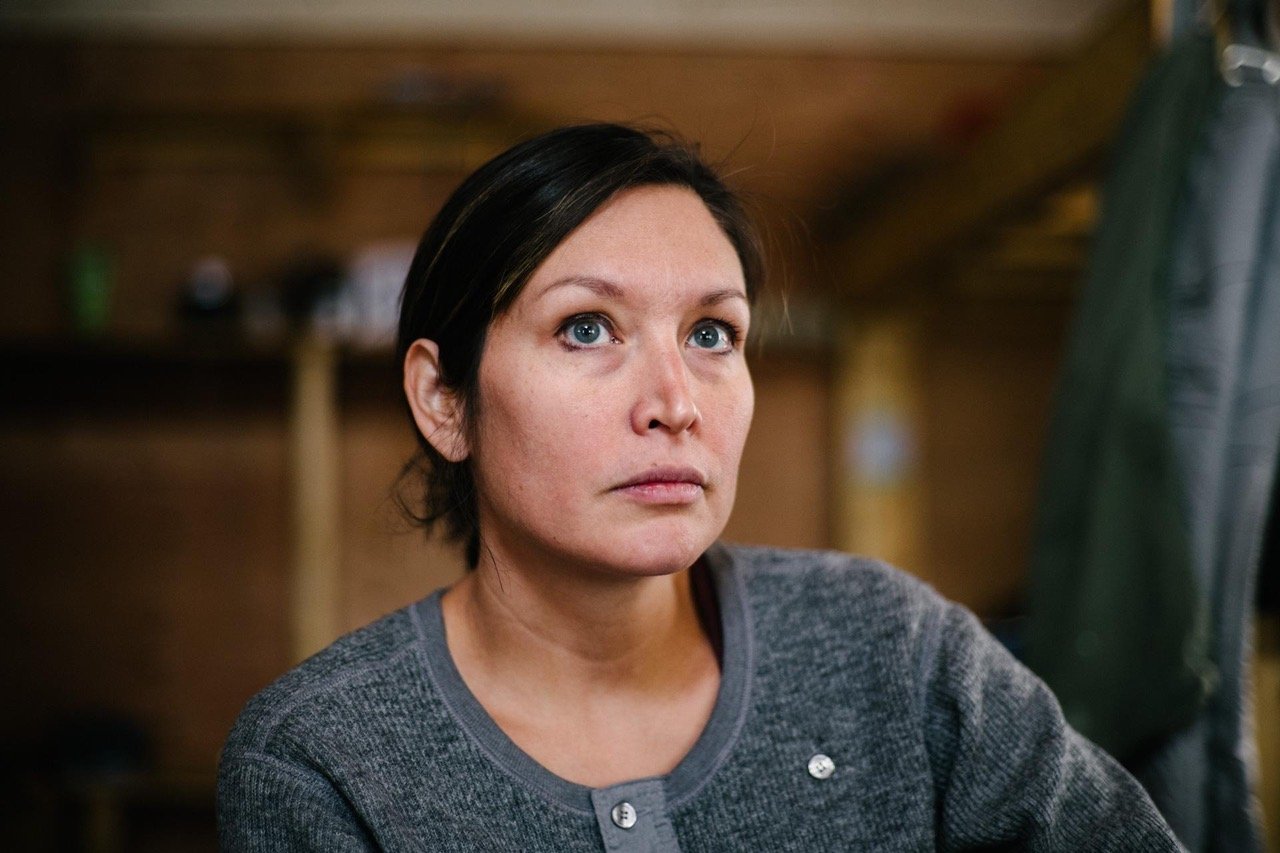The BC Environmental Assessment Office has issued a warning to Coastal GasLink after security guards wrongly blocked a Wet’suwet’en member attempting to monitor pipeline construction in her traditional territory.
But Molly Wickham, who was turned away by security guards, said that tougher penalties should have been imposed to stop the pipeline company from illegally denying Wet’suwet’en access to the land.
Wickham, who carries the hereditary name Sleydo’, said she was checking on pipeline construction on Cas Yikh territory, which is a house group of the Wet’suwet’en Gidimt’en Clan, when she was turned back on March 6.
The incident was not isolated, she added, with pipeline security blocking access to the route for several weeks this spring as right-of-way clearing took place just east of the Morice River near Smithers, B.C.
Wickham says it’s not the first time Coastal GasLink has violated Indigenous rights by preventing access to the territory, and that stricter measures are needed to deter future infractions.
“I would expect when they violate Indigenous rights, and when they violate our rights to access our territory, that would be taken seriously,” she says. “It’s not an isolated incident. It happens to us all the time, and there should have been some sort of repercussions.
“I don’t think a warning is strong enough.”
The Environmental Assessment Office has the ability to seek fines of up to $2 million for such violations.
In an email to The Tyee, a spokesperson from Coastal GasLink said that COVID-19 precautions were the reason for restricting access to the pipeline route. Coastal GasLink did not respond to The Tyee’s interview requests.
“This access restriction was at the height of COVID-19 and as our priority is safety in everything we do, protecting our workers and the public from the risk of COVID spread was, and still is, paramount,” the statement reads. “Ensuring the health and safety for all involved by limiting contact between public and workforce was a part of that strategy.”
But the EAO’s warning, issued July 28 after an investigation into the incident, determined that the reasons given by the company — which included COVID-19 restrictions, an injunction and worksite safety — did not apply.
According to an 18-page inspection report, the EAO’s compliance and enforcement director Chris Parks found that security for the pipeline company unnecessarily denied access at the turnoffs to two spur roads 56 and 63 kilometres down the Morice West Forest Service Road, not far from the Unist’ot’en Healing Centre.
The healing centre, which provides Indigenous cultural programming, was the site of high-profile arrests in February 2020 when RCMP removed Wet’suwet’en and supporters who were blocking the remote forestry road. In total, 28 people were arrested at four sites along the Morice road over five days.
In one of three responses provided by Coastal GasLink to the Environmental Assessment Office before the report was finalized, the company noted that the person who was refused access was an “opponent of the project.”
In its report, the EAO rejected the suggestion that Wickham’s stance on the pipeline should have anything to do with the decision.
“The identity of the complainant is not relevant to the compliance determinations, other than that the complainant is a Wet’suwet’en person,” the report reads. “The views of the complainant with regard to the project are not relevant to and have not informed the compliance determinations in this record.”
In its findings, the EAO said the pipeline company claimed that “there are no traditional land-use sites identified in the areas” the individual was attempting to access, and that the complainant stated the purpose of accessing the area was to monitor pipeline construction activities.
The investigator disagreed that monitoring pipeline construction did not constitute a traditional activity.
“The complainant identified herself by name and role as a supporting hereditary Chief of the territory, and stated the purpose was cultural monitoring of the territory pursuant to her responsibilities under the Wet’suwet’en hereditary governance system,” the report said.
The investigator ultimately found “cultural monitoring of activity within a territory to be consistent with and a component of traditional use.”
According to the report, the two incidents happened midday, about a half-hour apart, at checkpoints located several kilometres from the pipeline route. Wickham attempted to access the area by truck, but security parked at the turnoffs was limiting access to pipeline workers.
“CGL security staff stated that the Wet’suwet’en person could not proceed further, noted that there were active work zones ahead,” and stated that COVID-19 restrictions “constrained the security staff’s ability to allow the Wet’suwet’en person to proceed past the sites,” the report reads.
At one point, security staff referenced an injunction as the reason for restricting access, it said.
On Dec. 31, 2019, the BC Supreme Court issued an injunction sought by Coastal GasLink in response to roadblocks established along the Morice forestry road by those opposing the pipeline. The injunction prevents anyone from blocking access to work sites or roads that access the pipeline route. It doesn’t restrict the movement of people on roads through the area.
The inspection report also found that while the company is permitted to restrict access for safety reasons, it had not demonstrated that work sites in the area presented a risk at the time of the encounter.
“A delay of access at or through an active worksite must be specific to the active worksite,” the report said. “The evidence presented by the Office of the Hereditary Chiefs of the Wet’suwet’en and the Wet’suwet’en person appears to demonstrate that access was prohibited at locations that were a significant distance from the right-of-way and active work areas.”
It noted that the roads pre-date the project and are considered public, although they were being maintained by Coastal GasLink.
Coastal GasLink said the company had plowed a single-lane path that would’ve required anyone accessing the area to enter an active worksite in order to turn around.
But the EAO inspector made several site visits in late April and early May, including a helicopter fly-over, and examined existing aerial footage to determine there were “multiple locations for turnouts” between the checkpoint and any active work areas.
“CGL has not provided evidence that the roads in question, both pre-existing public roads, were active work areas at the time the complainant was denied access,” it said.
“CGL has not demonstrated that they have authorization to prevent access for Indigenous persons or the public to public roads at locations that are not active worksites,” it said.
On the balance of probability, the complainant could have safely accessed the road, the office found. “Therefore, access was not delayed for safety purposes,” it concluded.
At the second checkpoint, the report found, pipeline security did not give the reason that the roads were unsafe, but instead said access was restricted due to public health orders.
B.C.’s provincial health officer issued an order late December following COVID-19 outbreaks at two Coastal GasLink work camps that outlined a graduated return to work following the holidays, fearing that a mass restart could present a health hazard for the region.
The EAO said it had reviewed the orders and found they were specific to pipeline workers.
“These orders regulate CGL staff and contractors, and do not provide Coastal GasLink with the authority to restrict the access of Wet’suwet’en people to areas that are not project worksites,” it said.
It also rejected the idea that its findings suggest that third parties be granted “immediate, unannounced access to active work sites.”
“In no way do the findings of this inspection record support this concern,” it said. “Where active work is underway, CGL has the responsibility to ensure the safety of all parties in the area and access can clearly be delayed until it is safe for Indigenous individuals or others to travel the road.”
Wickham said the months-long review process and lack of consequences discourages nation members from filing the complaints. She added that it’s not the first time the company has prevented Wet’suwet’en from accessing the territory.
Coastal GasLink was found to be out of compliance with its environmental assessment certificate after it denied access to traplines managed by the Unist’ot’en house group in January 2019 and destroyed traplines in the area.
At the time, hereditary Chiefs called for a stop-work order. Instead, in a clarifying letter to Coastal GasLink, the EAO explained that the resulting order meant pipeline work could continue, with restrictions.
“The order is not an order to cease all activity within the trapline area and it does not restrict all construction activities within the trapline area,” the letter from compliance and enforcement officer Parks said. “CGL must consider what activities may adversely impact the use of the trapline, and cease those activities, as stated in the order.”
In an email to The Tyee, Ministry of Environment communications manager Robert Duffus said there are a range of enforcement options available for resolving cases of non-compliance. Those are determined by the EAO and could include warnings, $575 violation tickets, administrative penalties up to $750,000 or court-imposed penalties up to $1 million for a first conviction and $2 million for subsequent convictions.
“A warning notifies certificate holders in writing that they are not in compliance, and it warns of the possibility of an escalating response should the non-compliance continue,” Duffus said.
Enforcement officials will continue to monitor the non-compliance activities.
But Wickham said that monitoring does not appear to be happening. She fears that without more stringent consequences, Coastal GasLink will continue to prevent Wet’suwet’en members from accessing the territory.
“We have a right to know, and we have a right to monitor the work that they’re doing,” she said. “Nobody’s been watching them, so it’s up to us to do that.” ![]()
Read more: Indigenous, Energy, Rights + Justice

















Tyee Commenting Guidelines
Comments that violate guidelines risk being deleted, and violations may result in a temporary or permanent user ban. Maintain the spirit of good conversation to stay in the discussion.
*Please note The Tyee is not a forum for spreading misinformation about COVID-19, denying its existence or minimizing its risk to public health.
Do:
Do not: